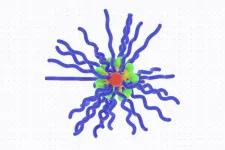EMBARGOED FOR RELEASE UNTIL 4 P.M. ET, WEDNESDAY, APRIL 19, 2023
MINNEAPOLIS – A drug called teriflunomide may delay first symptoms for people whose magnetic resonance imaging (MRI) scans show signs of multiple sclerosis (MS) even though they do not yet have symptoms of the disease. The preliminary study, released April 19, 2023, will be presented at the American Academy of Neurology’s 75th Annual Meeting, being held in person in Boston and live online from April 22-27, 2023. Called radiologically isolated syndrome, the condition is diagnosed in people who do not have MS symptoms but who have abnormalities in the brain or spinal cord called lesions, similar to those seen in MS.
MS is a disease in which the body’s immune system attacks myelin, the fatty white substance that insulates and protects the nerves. Symptoms of MS may include fatigue, numbness, tingling or difficulty walking.
“With more and more people having brain scans for various reasons, such as headache or head trauma, more of these cases are being discovered, and many of these people go on to develop MS,” said study author Christine Lebrun Frenay, MD, of the University Hospital of Nice in France and a Fellow of the American Academy of Neurology. “The sooner a person can be treated for MS, the greater the chances of delaying damage to the myelin, which decreases the risk of permanent neurologic impairment and debilitating symptoms.”
The study involved 89 people with radiologically isolated syndrome. Half of the people were given 14 milligrams (mg) of teriflunomide daily and the other half were given a placebo. They were followed for up to two years.
During the study, eight people who took the drug developed MS symptoms, compared to 20 who took the placebo.
After adjusting for other factors that could affect the risk of developing symptoms, researchers found that people taking teriflunomide had a 72% lower risk of experiencing first symptoms than those taking the placebo.
“Our findings suggest that early intervention with teriflunomide may be beneficial to those diagnosed with radiologically isolated syndrome, the presymptomatic phase of MS,” Lebrun Frenay said. “However, more research is needed in larger groups of people to confirm our findings. Additionally, it is important that medical professionals are cautious when using MRI expertise to diagnose this condition, selecting only patients at risk of developing MS and not increasing MRI misdiagnoses.”
The study was supported by Sanofi, the company that makes teriflunomide.
Learn more about multiple sclerosis at BrainandLife.org, home of the American Academy of Neurology’s free patient and caregiver magazine focused on the intersection of neurologic disease and brain health. Follow Brain & Life® on Facebook, Twitter and Instagram.
When posting to social media channels about this research, we encourage you to use the American Academy of Neurology’s Annual Meeting hashtag #AANAM.
The American Academy of Neurology is the world’s largest association of neurologists and neuroscience professionals, with over 40,000 members. The AAN is dedicated to promoting the highest quality patient-centered neurologic care. A neurologist is a doctor with specialized training in diagnosing, treating and managing disorders of the brain and nervous system such as Alzheimer’s disease, stroke, migraine, multiple sclerosis, concussion, Parkinson’s disease and epilepsy.
For more information about the American Academy of Neurology, visit AAN.com or find us on Facebook, Twitter, Instagram, LinkedIn and YouTube.
Dr. Lebrun Frenay will present the study findings at 6:24 p.m. ET, Tuesday, April 25, in the Room 253 AB Boston Convention and Exhibition Center.
Please send an email to media@aan.com to schedule an advance interview.
Emerging Science abstracts are embargoed until 12:01 a.m., ET, Friday, April 21, 2023, unless otherwise noted by the Academy’s Media and Public Relations Department.
To access Non-emerging Science abstracts to be presented at the 2023 AAN Annual Meeting, visit https://www.aan.com/events/annual-meeting-abstracts-awards.
END
Study: drug may delay earliest symptoms of multiple sclerosis
2023-04-19
(Press-News.org)
ELSE PRESS RELEASES FROM THIS DATE:
Simple test may predict cognitive impairment long before symptoms appear
2023-04-19
EMBARGOED FOR RELEASE UNTIL 4 P.M. ET, WEDNESDAY, APRIL 19, 2023
MINNEAPOLIS – In people with no thinking and memory problems, a simple test may predict the risk of developing cognitive impairment years later, according to a study published in the April 19, 2023, online issue of Neurology®, the medical journal of the American Academy of Neurology.
“There is increasing evidence that some people with no thinking and memory problems may actually have very subtle signs of early cognitive impairment,” said study author Ellen Grober, PhD, of Albert Einstein ...
For people with epilepsy, neighborhood may be tied to memory, mental health
2023-04-19
EMBARGOED FOR RELEASE UNTIL 4 P.M. ET, WEDNESDAY, APRIL 19, 2023
MINNEAPOLIS – People with epilepsy living in disadvantaged neighborhoods—areas with higher poverty levels and fewer educational and employment opportunities— may be more likely to have memory, thinking, and mental health problems compared to people with epilepsy living in neighborhoods with fewer disadvantages, according to new research published in the April 19, 2023, online issue of Neurology®, the medical journal of the American Academy of Neurology. The study does not prove that living in disadvantaged neighborhoods causes ...
Surgery for sciatica reduces leg pain and disability for some people, but benefits are short-lived
2023-04-19
Surgery to relieve leg pain and disability in some people with sciatica may be better than other non-surgical treatments, but the benefits are short-lived, lasting only up to 12 months, finds an analysis of the latest evidence published by The BMJ today.
What’s more, the certainty of available evidence is low to very low, prompting the researchers to suggest that surgery might only be a worthwhile option for people who feel that the rapid relief outweighs the costs and potential risks associated with surgery.
Sciatica refers to pain that travels along the path of the sciatic nerve, from the lower back and down the leg. In some people, sciatica occurs ...
Scientists discover cause of sea urchin die-offs in the Caribbean: a protozoan parasite
2023-04-19
The long-spined sea urchin Diadema antillarum is a keystone species. Coral reefs rely on healthy sea urchins to eat algae so coral can thrive. Healthy coral means healthy fish, and their positive impacts continue up the food chain.
In early 2022, long-spined sea urchins in St. Thomas began to quickly die in large numbers. Scientists rushed in to find the cause and have discovered that a microscopic parasite swarms the body and spines of the urchins, eating them alive.
The culprit, a microscopic organism called a scuticociliate, appears most similar to Philaster apodigitiformis, a type of protozoan parasite. It began decimating sea urchin populations around the Caribbean, ...
How opioid drugs get into our cells
2023-04-19
The human body naturally produces opioid-like substances, such as endorphins, which block the perception of pain and increase the feeling of well-being. Similarly, opioid drugs, including morphine or fentanyl, are widely used for alleviating severe pain. However, their use is associated with a high risk of dependence and addiction, and their excessive misuse causes over 350,000 annual deaths worldwide. Researchers from the University of Geneva (UNIGE) have compared the action of natural and therapeutic opioids. The latter penetrate inside the cells ...
Grambank shows the diversity of the world's languages
2023-04-19
Linguists have long been interested in language variation. What are common or universal patterns across languages? What limits the possible variation between them? Grambank, the world's largest and most comprehensive database of language structure, enables researchers to answer some of these questions.
Grambank was constructed in an international collaboration between the Max Planck institutes in Leipzig and Nijmegen, the Australian National University, the University of Auckland, Harvard University, ...
Nanoparticles provoke immune response against tumors but avoid side effects
2023-04-19
CAMBRIDGE, MA — Cancer drugs that stimulate the body’s immune system to attack tumors are a promising way to treat many types of cancer. However, some of these drugs produce too much systemic inflammation when delivered intravenously, making them harmful to use in patients.
MIT researchers have now come up with a possible way to get around that obstacle. In a new study, they showed that when immunostimulatory prodrugs — inactive drugs that require activation in the body — are tuned for optimal activation timing, the drugs provoke the immune system to attack tumors without the side effects that occur when the ...
Informed by mechanics and computation, flexible bioelectronics can better conform to a curvy body
2023-04-19
MADISON – Today, foldable phones are ubiquitous. Now, using models that predict how well a flexible electronic device will conform to spherical surfaces, University of Wisconsin–Madison and University of Texas at Austin engineers could usher in a new era in which these bendy devices can integrate seamlessly with parts of the human body.
In the future, for example, a flexible bioelectronic artificial retina implanted in a person’s eyeball could help restore vision, or a smart contact lens could continuously sense glucose levels in ...
Killer heatwaves endanger India’s development
2023-04-19
Deadly heatwaves fuelled by climate change in 2022 made almost 90 percent of Indians more vulnerable to public health issues, food shortages and increased risks of death, a new study from researchers at the University of Cambridge reported in PLOS Climate.
India currently uses a national Climate Vulnerability Indicator (CVI) to measure climate vulnerability and make plans for adaptation. The CVI includes many different socioeconomic, biophysical, institutional, and infrastructural factors. But it doesn't ...
Newfound link between Alzheimer’s and iron could lead to new medical interventions
2023-04-19
There is a growing body of evidence that iron in the brain may play a role in Alzheimer’s disease. Lending weight to that idea, a new imaging probe has for the first time shown that in the same regions of the brain where the amyloid beta plaques associated with Alzheimer’s occur, there is also an increase in iron redox, meaning the iron in these regions is more reactive in the presence of oxygen. Their imaging probe could yield even more details about the causes of Alzheimer’s and help in the search for new drugs to treat it.
A ...



